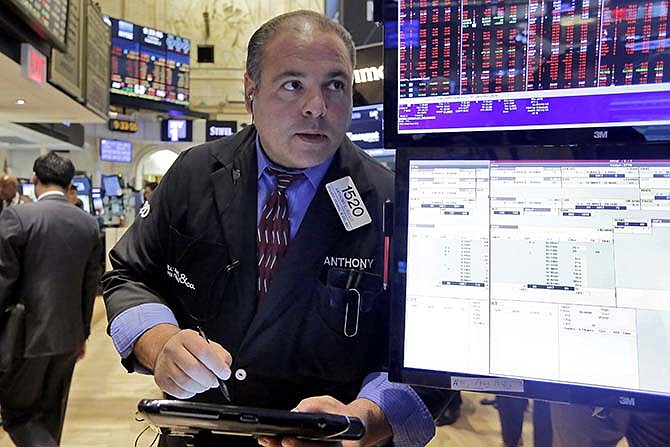NEW YORK (AP) - Stocks plunged again Tuesday, continuing a rocky ride for Wall Street, after an economic report out of China rekindled fears the world's second-largest economy is slowing more than previously anticipated.
The sell-off adds to what has been a difficult few weeks for U.S. and international markets. U.S. stocks just closed out their worst month in more than three years. Tuesday's drop also dashed hopes that, after some relatively calm trading Friday and Monday, the stock market's wild swings were coming to an end.
Stocks started the day sharply lower and never recovered, with the Dow Jones industrial average falling as much as 548 points. No part of the market was spared. All 10 sectors of the Standard & Poor's 500 index fell more than 2 percent. Just three stocks in the S&P 500 closed higher.
In the end, the Dow lost 469.68 points, or 2.8 percent, to 16,058.35. The S&P 500 fell 58.33 points, or 3 percent, to 1,913.85 and the Nasdaq composite fell 140.40 points, 2.9 percent, to 4,636.10.
As it's been for the last several weeks, the selling and problems started in Asia.
An official gauge of Chinese manufacturing fell to a three-year low last month, another sign of slowing growth in that country. The manufacturing index, which surveys purchasing managers at factories, dropped to a reading of 49.7 in August from 50.0 in July. A reading below 50 indicates a contraction.
The Chinese economy has been a focus for investors all summer, and the concerns have intensified in the last three weeks. China devalued its currency, the renminbi, in mid-August. Investors interpreted the move as a sign that China's economy was not doing as well as previously reported.
Faced with the possibility of slowing demand in China, the commodity markets once again took the brunt of the hit.
U.S. crude oil fell $3.79 to close at $45.41 a barrel in New York. Brent Crude, a benchmark for international oils used by many U.S. refineries, fell $4.59 to close at $49.56 in London.
Energy stocks were once again among the biggest decliners. Exxon Mobil fell nearly 4 percent and Chevron fell 2.5 percent. Exxon is down 22 percent this year, Chevron 30 percent.
Along with worries about China, speculation about whether or not the Federal Reserve will raise interest rates as soon as this month continues to weigh on markets.
The Federal Reserve meets Sept. 16 and 17. Some economists are predicting that policymakers will be confident enough in the U.S. economic recovery to raise interest rates for the first time in almost a decade. While Fed officials are mostly focused on the U.S. economy, they cannot ignore problems in the global economy.
"China's problems are totally a concern for the Fed," said Tom di Galoma, head of rates trading at ED&F Man Capital. "With inflation remaining low here, I just don't a reason why they would raise rates."
Markets in Europe were broadly lower. Germany's DAX fell 2.4 percent, France's CAC-40 lost 2.4 percent and the U.K.'s FTSE 100 index declined 3 percent. Japan's Nikkei 225 was also volatile, dropping 3.8 percent. The Hang Seng in Hong Kong sank 2.2 percent. Stocks also fell in South Korea and Australia.
The dollar fell to 119.68 yen from 121.20 yen on Monday. The euro rose to $1.1307 from $1.1225.

